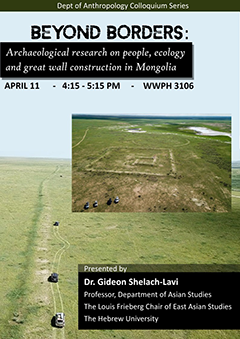Beyond Borders: Archaeological Research on People, Ecology and Great Wall Construction in Mongolia

Join us for a presentation on research Dr. Shelach-Lavi began in Mongolia in 2018.
In his own words:
Sometime during the 10th to 13th centuries CE, a system of long walls (or 'Great Wlls') was built in areas currently lcoated inNorth China and Mongolia. The network of walls, ditches, forts, and enclosures covers an estimated area of 4000 km, situated in marginal stepper and desert zones. While this is one of the longest and most elaborate systems of its kind the world has ever seen, it remains unclear who built it, when sxactly it was built, and for what purposes. Over the past five years, our research project ("The Wall: People and Ecology in Medieval Mongolia and China") has conducted a systematic investigation, including archaeological surveys and excavations across various segments of this wall neetwork. Additionally, we collected relevant historic, geographic, and paleoclimatic data.
The data collected so far allow us to accurately map different sections of this system, including parts that are currently not visible on the surface, to better date different sections of the wall system, and to uncover information not only on the method used in the construction of the wall and associated features, but also on the people who built and manned them. In this talk, I will present some of these results as well as discuss our current understanding of the reasons for constructing such an extensive monument.
Dr. Gideon Shelach-Lavi is the Louis Freiberg Professor of East Asian Studies at the Hebrew University of Jerusalem, and a Pitt Anthropology alumnus (PhD 1996). Since 1995, Dr Shelach-Lavi has conducted archaeological fieldwork in North China. He recently completed the Fuxin Regional Archaeological Project in Liaoning province, China. In 2018, he started a new field project in Shandong province – the Mi River Basin Archaeological Project, as well as the Northeastern Mongolia Archaeological Project.
The talk is open to all and will take place on Thursday, April 11th, in Posvar 3106 from 4:15 - 5:15 pm. Hosted by the Department of Anthropology.
